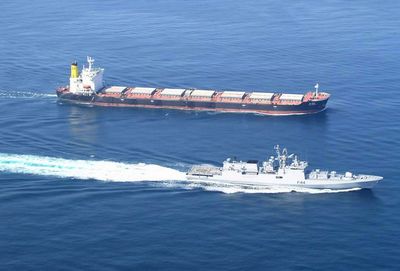Indian Navy sinks pirate ‘mother ship’
Vessel failed to stop; crew reportedly fired on Indian ship

NEW DELHI, India – An Indian Navy frigate on Tuesday battled with and sank a suspected Somali pirate “mother ship” in the Gulf of Aden, one of the world’s busiest and most lawless shipping lanes.
Amid a surge of piracy around the hijacking-plagued Horn of Africa, the Indian Navy said in a statement that fire from its INS Tabar set the pirate vessel aflame after it failed to stop for investigation.
The Indian Navy statement said the crew of the renegade vessel could be seen onboard with a full complement of modern weapons and tools – satellite phones, night-vision goggles, AK-47 assault rifles and rocket-propelled grenade launchers. The ship was spotted while the Tabar was patrolling 285 nautical miles southwest of the coast of Oman on Tuesday evening.
The crew of the Tabar demanded the vessel stop. But the pirate ship responded by threatening to “blow up the naval warship if it closed on her,” the Indian Navy statement said. The pirates then fired on the Tabar, and the crew of the Indian ship responded.
“Pirates were seen roaming on the upper deck of this vessel with guns and rocket-propelled grenade launchers. The vessel continued its threatening calls and subsequently fired upon INS Tabar,” the Indian Navy said in a statement.
Some of the pirates tried to escape on two speedboats that the larger vessel had in tow. The Indian sailors gave chase. One boat was later found abandoned, while a second boat escaped.
More than 90 ships have been hijacked off Somalia this year, a country that has not had a functioning national government since 1991 and has suffered continuing chaos and rule by small factions.
Maritime experts say powerful warlords in Somalia hire fishermen to commit acts of piracy, claiming hundreds of thousands of dollars in ransom from hijacked shipping boats from around the world. The warlords use the money to buy more sophisticated weapons and equipment, the experts say.
The Somali pirates typically demand more than $1 million per vessel in ransom. Negotiations between pirates and shipowners have taken months at times, with the hijacked crews held captive in Somalia until an agreement is reached.
Several countries have deployed naval vessels to the area to fight the pirates. In September, the United States announced that it has several warships off Somalia.
The overnight battle in the Gulf of Aden, the gateway into the Suez Canal and the main shipping route from Asia and the Middle East to Europe, came days after the Saudi-owned Sirius Star supertanker was seized along with 25 crew members. It was the biggest tanker ever hijacked and was carrying a cargo of 2 million barrels of oil – a quarter of Saudi Arabia’s daily output, valued at $100 million.
The ship remains anchored off the Somali coast. Wire services reported on Wednesday that Saudi Foreign Minister Prince Saud al-Faisal said that the owners of the tanker were “negotiating on the issue,” and would be “the final arbiter” on how to get the crew, the tanker and the load of oil released.
The INS Tabar has been patrolling the Gulf of Aden since Oct. 23. It has escorted 35 ships safely through the “pirate-infested waters,” the statement said.